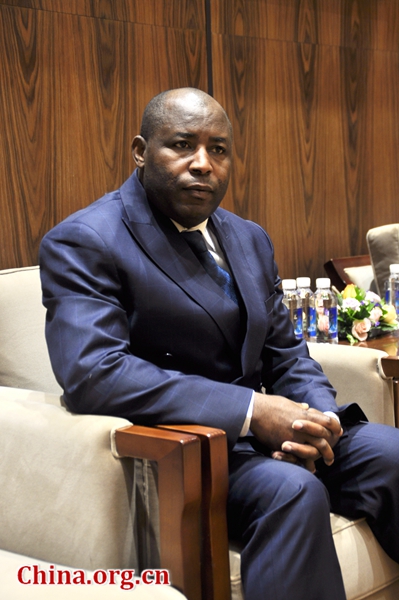Ndayishimiye: China-Africa cooperation sincere
- By Zhang Junmian
 0 Comment(s)
0 Comment(s) Print
Print E-mail China.org.cn, September 27, 2018
E-mail China.org.cn, September 27, 2018

China's cooperation with African countries, including Burundi, is based on the principles of sincere friendship, mutual benefits and win-win results, said Evariste Ndayishimiye, secretary general of the CNDD-FDD of Burundi, the country's ruling party, during an interview with Chinese media on the sidelines of an international think tank forum recently held in Dunhuang, northwest China's Gansu province.
Ndayishimiye denounced accusations in some foreign media of China practicing neo-colonialism in Africa, retorting that China is sincere in helping African countries and has offered them various support for social and economic development.
The Western allegations are false and cannot hold water, Ndayishimiye said, stressing that in contrast to Western countries, China supports Africa's economic development without any political strings attached.
China and African countries have set a model for equal exchanges, mutual benefits and win-win cooperation among big and small countries, Ndayishimiye continued.
Moreover, Ndayishimiye is full of confidence about the future prospects of China-Africa cooperation under the Belt and Road Initiative (BRI), which was proposed by China in 2013 with the aim of enhancing connectivity in policy, facilities, trade, finance and people-to-people bonds among countries in Asia, Europe and Africa along the ancient Silk Road routes.
Ndayishimiye noted that China has greatly helped Burundi, a landlocked country, in its infrastructure development, and carried out pragmatic cooperation with Burundi in many areas, including agriculture, information technology, medical and healthcare, and education.
In the future, the two countries could conduct cooperation in more areas, such as environmental protection, new energy and mineral resources, Ndayishimiye suggested.
Yet he finds that China-Africa cooperation under the BRI's framework is faced with two major challenges.
The first challenge stems from certain disturbances and interference from Western countries, which are trying to disrupt the cooperation between China and Africa through various measures, including creating public opinion pressure, or imposing sanctions on some African countries.
The second challenge is where some African countries are unable to make good use of foreign capital as they have a weak foundation in many aspects.
To tackle this challenge, China can implement some concrete plans, carry out assessment on specific projects to determine whether such projects are worth the investment, and help African countries strengthen their production capacity, so that African countries could better use China's financial support for development, Ndayishimiye elaborated.
The Belt and Road Forum for International Think Tank Cooperation was held between Sept. 18 and 20, with approximately 150 delegates, including political party leaders, government officials, think tank experts and entrepreneurs from 32 countries sharing their wisdom and insights on the prospects of strengthening economic and trade cooperation, and people-to-people ties.





